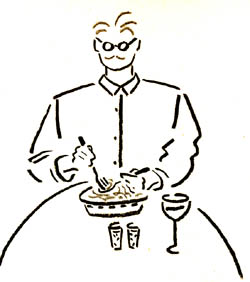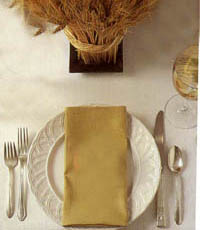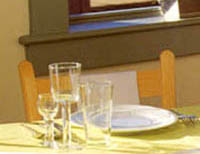 |
Manners, Customs, Clothing
Eating Alone
Marian T. Horvat, Ph.D.
I recently came across an article titled “Eating alone” written by a young man who lived alone. Always in a rush, never sitting down, he admitted that he had succumbed to some loutish habits at mealtime.
He rarely ate a meal, but found himself grazing, grabbing a sandwich or super-burger here, a bag of chips or yogurt there. At home, he ate standing up and gobbled food straight from the carton or pan, too fast, of course, and usually too much. Eating fast food or snacks in front of the television was routine. “Happy the man who never has to dine alone,” he bemoaned.

Keep your dignity when you eat alone |
Nearly 26 percent of Americans - 73 million people - live alone. Many of these singles, children of the children of the cultural revolution, have left off making the extra effort in dining that being civilized demands. But no one is doomed to be a slob because he or she lives and eats alone. The Catholic man faces the problems, makes the decision to combat the modern lifestyle, and then makes an aim to sit down and eat regular meals in a civil manner. He does this not just because it is better for the health, but also because he realizes it is important factor in the spiritual life.
A matter of health and spirit
Health concerns are forcing many single adults to re-evaluate their poor eating habits. Recent studies show that people who live alone are more prone to weight gain and long term health problems caused by poor eating habits. Such habits also contribute to the increasing cases of bulimia, bingeing and other eating disorders. The modern man is more and more obsessed by food, and less and less nourished or satisfied by it.
But there is much more than health at question here.
The serious Catholic strives for perfection not just in his spiritual life, but in every aspect of life, spiritual and temporal. He understands that the two spheres are intricately connected, which is why once, in the glorious past of Christian Civilization, we achieved such a high level of culture and refinement.
Man does not just eat for physical need or material pleasure. He disciplines himself to rise above his animal instincts: to sit erect, to use napkins and silverware, to restrain himself from eating too quickly, and so on. His manners are not just to impress his neighbor. They are meant to reflect a striving for perfection that reflects his love of God and respect for himself.
Therefore, even when he eats alone, he is dignified. He respects himself by sitting down clean and neatly dressed to a properly set table and eating with civility. He respects himself by practicing self-control and temperance. He does not stuff himself like an animal, but takes his meal calmly and with the pleasure of the man who uses reason to govern his passions and refine his palate.

Even take out food is more enjoyable when it is attractively arranged on a plate |
The Catholic never eats without first praying, whether he eats alone or with others, at home or in a restaurant. Before sitting down to eat, he makes the Sign of the Cross and say the Grace before a Meal: Bless us, O Lord, and these Thy gifts which we are about to receive from Thy bounty, through Christ our Lord. Amen
After the meal is finished, he rises from the table and say the Thanksgiving after the Meal: We give Thee thanks, Almighty God, for all Thy benefits, Who livest and reignest, world without end. Amen. Then he makes the Sign of the Cross to conclude the meal. Doing this he makes his meal an act of prayer that nourishes and benefits the spirit as well as the body.
The modern-day scenario
Now, let me turn again to a common modern day scenario. Jennifer comes home famished because she is on a diet and skipped lunch. She only had a coke and energy bar for breakfast. She puts a prepared pasta tray in the microwave, then eats a half package of Oreo cookies and drinks a pint of milk straight from the carton while she waits the five minutes for the tray to heat. Out comes the pasta, which she stands and eats from the tray as she watches the evening news on the kitchen TV. She is still hungry, so she eats a pint of chocolate fudge ice cream.
When she finishes, she feels terrible, disgusted with herself and generally dissatisfied. It is not surprising. How can she respect herself after such a display of intemperance and gluttony?
Jennifer is not alone. Many of the youth today are the product of homes where families did not eat together. So they have the habit of eating what they want and when they want. Where does a people who glorify impulse and self-complacence end? They are heading to tribalism in habits and ways of being.
The Catholic response
In face of the general decline of civility, the Catholic takes a counter-revolutionary attitude. That is to say, he aims to counter disorder with order, vulgarity with refinement, undisciplined behavior with good habits. So he determines to eat with civility, and not like a hippy.
There is much talk of the cultural revolution, but very little serious analysis of the habits and ways of being that should change for it to be battled effectively. A real cultural counter-revolution would be to affirm good customs and refined manners in daily living in order to counter tribalism and hippyism. One place to begin the battle is at the table with a restoration of good manners and eating habits.
Practical suggestions for dining alone

Setting a simple but attractive place setting encourages polite dining alone
 |
Establishing a few rules and following them can help keep the dining experience pleasant and civilized for the man or woman who eats alone. A few examples follow:
- Wash your hands and arrange yourself before eating as if you were in the company of others.
- Do not eat standing up. Set the table properly and sit down to dine with good dishes and silverware in a nice ambience – even fast food can be attractively arranged on a plate. You will have to overcome the notion that there isn’t time to sit down to eat at home. Studies show that the average sit-down meal takes 20 minutes. It takes only a few extra minutes to set the table and do things right.
- Never eat out of boxes, cartons or bags. If you have a soft drink or beer, pour it into a glass. It is wrong to drink straight from a can or milk carton.
- Eat slowly. Sit straight, don’t slouch and use your napkin.
- Never omit the before and after the meal prayers.
- If you need an extra spiritual incentive, recall to mind that in reality, you are not alone. Remember you are always in the company of your angel, whom you do not want to repulse or offend.

Posted January 14, 2005

Related Topics of Interest
 Fast Food Is Protestant Fast Food Is Protestant
 Manners Make Life Easier Manners Make Life Easier
 Courtesy in the Catholic Home Courtesy in the Catholic Home

Related Works of Interest
|
Manners | Cultural | Home | Books | CDs | Search | Contact Us | Donate

© 2002- Tradition in Action, Inc. All Rights Reserved
|
 |

|